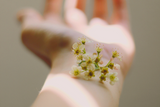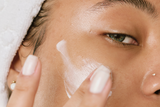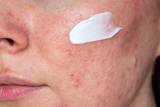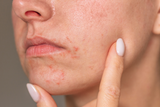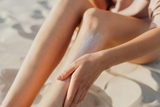Easy Peasy You
Is less really more? What leaving it out does to your skin
Posted by Lara Schimweg on
Many cosmetic products can irritate your skin.
With fewer products and ingredients, you have more control over your skincare.
Avoid fragrances, alcohol, harsh surfactants, soap and other irritating ingredients.
Charcoal masks, ash soaps , rose water , special serums, and even stronger active ingredients like niacinamide or natural salicylic acid are trending and promise beauty or even eternal youth. The market offers countless products, from conventional to clean to natural cosmetics , depending on your preference. But let's be honest: Is this really healthy? And when does it become too much for your skin? Or are more potent active ingredients perhaps necessary in skincare?
Is less really more?
It's often suggested that you absolutely should do a lot to get your skin problems under control and avoid aging. The market seems to have a miracle cure for every little issue. However, having lots of bottles with all sorts of active ingredients cluttering your bathroom cabinet is quite expensive in the long run and makes your daily routine really tiring. Online, on Instagram, and on YouTube, you're constantly told that your routine should consist of 10 or more different steps.
If you use a lot of products on your skin, then there are probably many ingredients that can irritate it. Trendy skincare products, in particular, are often especially harmful. It's best to steer clear of irritating products, because you want to care for your skin, not damage it.
You can eliminate these ingredients immediately.
Fragrances
Take fragrances, for example: they aren't exactly skin-friendly, yet unfortunately, they're found in almost all skincare products. In conventional cosmetics, it's usually perfume, with a wide variety of names. In natural cosmetics , essential oils replace synthetic fragrances. All types of fragrances can sensitize the skin and trigger contact allergies . So remember: if a skincare product smells floral, it likely contains irritating fragrances.
drying alcohols
And what about alcohol? Alcohol is frequently used as a preservative in natural cosmetics. Are alcohols bad for the skin? Not all alcohols are a problem. You should only avoid drying alcohols. These shouldn't be in your skincare routine, as they dehydrate your skin and irritate sensitive skin. A more detailed article on alcohols is in preparation.
Flower hydrosols
Flower hydrosols, such as rose water, are a hybrid of alcohol and fragrances. They not only smell wonderful, but they are also pure and plant-based, which sounds very healthy at first glance. This is why there is so much confusion surrounding them – especially among proponents of natural cosmetics. Unfortunately, there is a common misconception that flower waters can moisturize and have nourishing properties for the skin. Pure water, on the other hand, is often considered a filler.
Unfortunately, the opposite is true: Water is very gentle and dissolves many active ingredients and extracts beautifully in it. Water in your skincare is therefore much more than just a filler.
Extracts and active ingredients can also be dissolved in floral waters. So, at first glance, it all sounds very good. But we're sorry to say: Unfortunately, floral hydrosols of any kind, whether naturally derived, organic, or conventionally produced, are very irritating to your skin. This is because all floral hydrosols contain essential oils and drying alcohols. And as if ingredient lists on skincare products weren't complicated enough already, floral hydrosols make things even more difficult, because alcohols and essential oils aren't listed in the ingredients. They don't have to be declared because they occur naturally in the floral water. If you'd like to learn more, read our detailed article about rose water here .
Water contains no alcohol or fragrances, making it the gentler option. Incidentally, distilled water is always used in cosmetics. It's germ-free and therefore very gentle on the skin. If you prefer plant-based ingredients, you can use products containing plant juices. For example , aloe vera juice or green tea contain natural active ingredients that have a positive effect on the skin. Green tea, for instance, has anti-inflammatory properties and regulates sebum production.
Too harsh surfactants
When it comes to cleansing , surfactants (washing agents) come into play. You need them to gently wash away dirt, sunscreen, or makeup from your skin. Some surfactants are very harsh. This means they are very strong and can dry out your skin, stripping it of its natural oils over time. Your skin's natural oils protect it from losing too much moisture. Particularly sensitive skin reacts strongly to harsh cleansing products. This can lead to redness and irritation, which can make your skin barrier even more sensitive in the long run. It's better to choose a cleansing product with very mild surfactants. Incidentally, soaps contain very harsh surfactants and damage your skin's protective barrier. Therefore, you should avoid soap as much as possible.
If you simply omit the aforementioned ingredients from your skincare routine, you'll already be doing your skin a lot of good.
And then there are a few substances that can be particularly irritating to sensitive skin. To be on the safe side, it's recommended to avoid these substances as well.
Too many vegetable oils
There are a few things to keep in mind here as well. Some people's skin is very sensitive to plant oils. Very oily skin types, for example, don't necessarily tolerate every oil. Sometimes, oily or sensitive skin can't tolerate any plant oils at all. This is because oil doesn't just contain one ingredient, but also a wealth of natural vitamins, minerals, and various fatty acids. That sounds very healthy at first, and it is: However, these components can also cause irritation. Therefore, it's important that you use the right plant oil for your skin type. Only then can you truly do something about your dry skin, flaking, itching, or redness. When choosing plant oils, be sure to check whether it's a seed oil, kernel oil, pulp oil, or flower oil. Like the flower hydrosols mentioned above, pulp and flower oils contain naturally occurring essential oils, which are considered fragrances. And these can irritate your skin. Here you can learn more about plant oils and their advantages and disadvantages .
So please only apply kernel or seed oils to your skin. Plant oils are found in many skincare products or can also be purchased pure. Always be aware that just a few drops of pure oil are already a lot of nourishment for your skin. It's easy to overdo it. Only very, very dry skin can tolerate larger amounts of oil. That's why ointments and rich creams are better suited for very dry skin. The same applies to night creams, which are often enriched with a variety of different rich plant oils.
PEG substances
PEGs (polyethylene glycols) are very often found in conventional skincare products. They act as emulsifiers, binding oils and water. They are also used as emollients and binders. They are very popular in the beauty industry because they improve a product's consistency.
PEGs are not used in natural cosmetics and are not permitted by natural cosmetics certifications because they are derived from petroleum. This is bad for the environment and unnecessary, as there are now many natural alternatives. Whether PEGs are harmful to humans is not yet fully understood. Perhaps more information will come to light in the coming years. PEGs are suspected of increasing skin permeability. As a precaution, you should therefore avoid them, especially if you have sensitive skin.
You should decide for yourself whether you want them in your skincare routine or not. If it turns out they have no negative effects, then you haven't done anything wrong for your skin by leaving them out. If the harmful effects on the body or skin are confirmed, then you've taken good precautions and protected your skin well. And it's better for the environment to avoid PEGs anyway.
Parabens
Parabens are synthetic preservatives. They are highly effective against all kinds of germs, ensuring that your skincare products remain usable for an extremely long time, even after opening. Parabens have a bad reputation: You've probably heard that they are harmful and can negatively affect the hormonal system. But is there any truth to this?
There is evidence that parabens could affect the endocrine system . Whether this applies to humans is currently unclear. However, according to the German Federal Institute for Risk Assessment (BfR), some parabens are considered safe, as the low amounts found in cosmetic products are unlikely to have a harmful effect on the endocrine system.
However, some parabens are banned, and others were recently partially banned by the EU Commission in baby products. For some parabens, the permitted concentration has been significantly restricted.
You should decide for yourself whether you want to expose your skin to parabens. There are far more harmful substances for your skin. However, keep in mind that if you use multiple products, you may end up with more parabens on your skin. There are now many paraben-free products on the market.
Genuine natural cosmetics do not use parabens as preservatives. All products are preserved naturally. The only drawback is that while parabens make cosmetic products extremely long-lasting, this is not the case with natural cosmetics. Natural cosmetics typically only last about six months after opening. You are best placed to judge whether this is a limitation for you. You will probably use up your skincare products within about three to six months.
You can also see it as a plus: Only buy what your skin really needs right now. Only open products when you're ready to use them. This way you throw away much less and it's much more sustainable for our environment.
One more tip: When buying natural, paraben-free products, always check how they are preserved. Drying alcohols are often used as preservatives, frequently in combination with essential oils, which, as mentioned, can be very harmful to your skin.
Many other ingredients, such as microplastics, silicones, petroleum jelly, uncertified palm oil , and the like, are simply unnecessary. They don't necessarily harm your skin, but they do pollute the environment. If you can avoid them, then do so, so we can all enjoy our planet for a long time to come.
You can remove these products from your skincare routine.
Alkaline skincare products
Make sure your skincare products have a pH value between 5 and a maximum of 7. This will help soothe your skin in the long run and reduce redness and inflammation.
But why is pH so important in skincare ? Your skin has an acid mantle that protects it daily from bacteria and viruses. These can cause inflammation. Even when your skin comes into contact with water, its pH level can shift after washing. With water alone, this isn't so bad. While there is harder and softer water, which also affects the skin, it's generally quite good at returning to its slightly acidic state. The situation is different when you cleanse your skin with alkaline products, such as soaps, or when you bathe in alkaline salts. Soaps and other alkaline products attack the natural acid mantle, making your skin more susceptible to viruses and bacteria that can cause inflammation. If your skincare has a naturally acidic pH, you're on the safe side, and inflammation can be largely avoided. So, in the future, look for skincare products with a pH between 5 and 6, as the average natural skin pH is 5.5.
As you can see, there are many ingredients and products you can eliminate from your skincare routine. However, keeping track of all of this while shopping can be quite complicated. That's why we're giving you an extra tip : If you use fewer products with as few ingredients as possible, it's easier to keep track and you won't overload your skin.
Summarized for you
- Many products irritate your skin.
- Fragrances, such as perfume and essential oils, irritate the skin and can trigger allergies.
- Many alcohols are drying.
- Flower hydrosols naturally contain fragrances and drying alcohol.
- Avoid using overly harsh surfactants in your cleaning products.
- You should choose plant oils according to your skin type. If you have very oily skin, it's best to avoid oils altogether.
- PEGs are suspected of making the skin more permeable.
- Parabens are suspected of having hormonal effects.
- Alkaline products destroy the protective barrier of your skin.
- With fewer products and ingredients, you have more control over your skincare.
- Tags: Allergie, Hautpflege, Rosacea
← Older Post Newer Post →
0 comments








